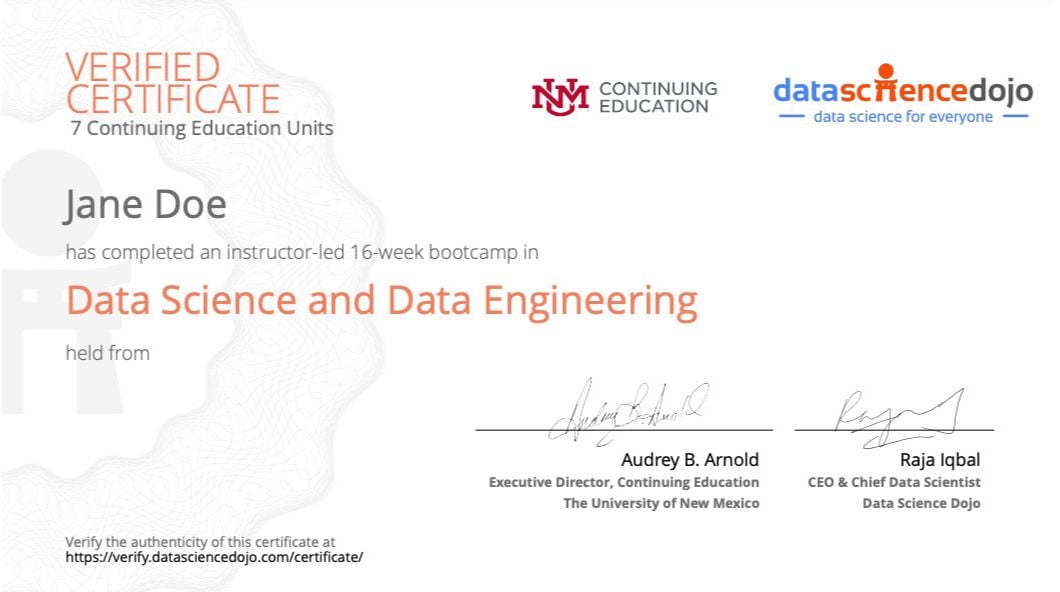Learn Data Science
Learn data science in-person or online with our data science courses. Learn data analysis, big data, and machine learning from experienced instructors.
4.95
11,000+
2,500+
900,000+

What Is Data Science Dojo?
Begin your professional career by learning data science skills with Data Science Dojo, a globally recognized e-learning platform where we teach students how to learn data science, data analytics, machine learning and more.
Our programs are available in the most popular formats: in-person, virtual instructor-led, and self-paced training. This means that you can choose the learning style that works best for you! From the very beginning, our focus is on helping students develop a think-business-first mindset so that they can effectively apply their data science skills in a real-world context. Enroll in one of our highly-rated data science programs and learn the practical skills you need to succeed in the field.
Why Learn Data Science with Us?
Instructor-led trainings
Study in a highly-interactive environment.
Hands-on experience
Test your knowledge on real-world problems.
Expert instructors
Learn data science from industry experts.
Help and support
Make the most out of the office hours.
Over 2500 Enterprises Trained








Our Trainings
Large Language Models BootcampNew
In-person
Duration: 5 days
Effort: 8 hrs/day
Data Science Bootcamp
Online
Duration: 16 weeks
Effort: 5 – 6 hrs/week
Python for Data Science
Self-paced
Coming Soon
Introduction to Power BI
Explore, and visualize data using Power BI Desktop to make data-driven.
Self-paced
Coming Soon
Practicum
Get a chance to work with professionals, right after your training. learn data science and gain quality experience with our practicum program.
duration: 6 months
effort: 8 hrs/day
Corporate Training
Strengthen your workforce with specially curated trainings. empower your team to extract valuable information from your organization’s data.
Supporting enterprises around the world









Earn a Verified Certificate

Eytan Bensoussan

Michael Hernandez

Jacky Sawyer
"Want a solid overview of common Python fundamentals for data analysis? Want to know how to evaluate data, clean it, visualize it, polish it, and feed it into a pipeline for machine learning? Look no further. I didn’t know lists from dictionaries before this, and now I have a lot of essential tools at my disposal to do bioinformatic analysis for my graduate research. Not only that, but all of the course material is available to me for an additional six months after the course ended. Plus, the instructors make sure they are available to help you and set you up for success."

"Extremely good bootcamp whereby you get multiple flavors of data science from theory to the practical applications. An intensive one-week exercise with engaging instructors polishes your skills and enhances your understanding of Data Science."

"Great high level training of multiple machine learning methods! It was a great refresher to my rusty stats degree."

"As someone with mathematics background doing management consulting, Data Science Dojo is exactly the training needed to bridge those two specialty: how to apply my mathematical knowledge in a real business setting."

"I couldn’t have asked for a better experience! I loved the instruction, the instructors, the pace, and the hands-on activities."

"Experiencing and experimenting with the tools of modern machine learning and predictive analytics is eye-opening!"

"My experience with the bootcamp is awesome! I was able to learn so much and I feel much more confident and prepared for future challenges I will face in my career."

"The Data Science bootcamp was an excellent experience. My instructor was superb, the content was thorough but presented in an accessible way. I'll be watching for more DSD bootcamp offerings in the future."

"Excellent course design, studying material and instructors! And a good balance between theory and practice. It is quite impressive what gets to be covered in a week, the best data science dive one could have."

"Great learning environment. Good material. Good teachers. The amount and quality of information learned was amazing!"

"Well thought out curriculum, promoted good discussion, passion for teaching and keen on making sure everyone understands the foundational concepts without rushing through. great pre- videos, resources, pre-configured experiments to speed up walk-throughs."

"Invaluable experience. I had little knowledge of machine learning and programming coming into the bootcamp, but feel more empowered and excited to tackle the world of predictive analytics!"

"I learnt a lot from the instructors during the bootcamp. I think the bootcamp is for everyone like the motto says. I feel that data science is way of thinking things through, rather than just a job. It as a solution to something. I am a whole different person after the bootcamp."

"This bootcamp is not only a great start and introduction for data science, but also very interesting to cover state-of-art techniques and tools used across industry. Very practical and fun classes."

"A great experience. Intense, interesting and useful – and I got some ideas to solve real world problems at work with a new tool set."

"The Dojo was incredible! It really helped me extend my comfort zone from analytics to full data science concepts with no pressure and full support. Can't wait to put these new skills into practice!"

"Great course! Solid content coverage. Great cost value. Worked well for a non-technical person (me). Days were run on time and on schedule."

"This is the best boot camp I have attended. The breadth of topics covered in Data Science was very helpful and what I was looking for."

"Fantastic approach to data science. Sets perfect context and gives enough knowledge/materials/tools to get cracking and keep learning."

"This is a one of the best programs offered out there for someone who would like to learn about data science in a short period of time."

"I feel like I am walking out with a solid understanding of data science as well as the resources to go further. The bootcamp transformed me from not knowing where to start to being able to build my own predictive models! "


